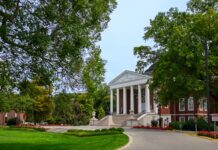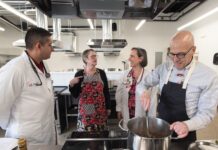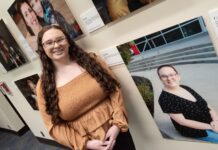Somerlin Cheek was in treatment in a substance abuse rehab facility in a tiny eastern Kentucky community when a doctor there asked her a question she hadn’t heard in a long time – “What did you want to be when you grew up?”
“My answer was I always wanted to be a social worker,” said the 24-year-old Somerset native. “But because I was in recovery, I thought that idea was off the table for me.”
But Cheek’s second chance was waiting for her, thanks to a unique opportunity to get the training and education she needed. The UofL Trager Institute’s Trauma-Informed Flourishcare™* Paraprofessional Training Program, which prepares participants for a behavioral health career, emphasizes recovery for people with substance use and other mental health needs throughout Kentucky.
This program is an example of just one of the many UofL partnerships and programs supported by federal funding from the Health Resources and Services Administration, which works to provide equitable health care to communities with the highest need.
At UofL, these federal funds create partnerships and programs that are making an increasingly important impact across the state by addressing health disparities and workforce development needs in social work, medicine, nursing, public health and dentistry.
Scholarships offered translate to more students able to fulfill their dream of a medical career or taking their career to the next level, as well as addressing rural shortages of primary care providers, nurses, nurse practitioners, therapists, social workers and public health professionals in eastern, southcentral and western Kentucky.
TRANSFORMING LIVES
Recent HRSA grants in medicine and nursing have added millions to collaborations that benefit the health of Kentuckians and boost health-related employment in areas that need it most.
In fact, Kentucky has a severe shortage of health care providers, with at least some portion of 113 of the state’s 120 counties designated as “health professional shortage areas.”

For Cheek, the paraprofessionals program offered her a new pathway to gain certifications and valuable internships to take her from UofL student to peer support specialist to community health worker. Now on the cusp of completing her associate degree in social work, Cheek said she plans to continue working for her bachelor’s degree from UofL online. With the support and training she is receiving, the community health worker can both support herself and continue her education, all from her own backyard in Harlan.
“This really gave me a broader vision of going into social work,” Cheek said. “It is honestly mind-blowing to me all the different doors this program has opened forme, to have this opportunity that I never dreamed was possible.”
In addition, learners such as Cheek are given credit for their “lived experience,” said Natalie Gober, director of the paraprofessionals program. “In the behavioral health field, we’ve started to see more clearly the value of peer support positions or people who have that lived experience working in the field,” she said. “It also provides a nontraditional access point for people who may have been through recovery or have struggled with mental health, and who want to give back and help others in the ways that they’ve been helped.”
BUILDING A WORKFORCE
In summer 2023 UofL School of Nursing received $6.5 million through two new HRSA grants to help increase Kentuckians’ access to health care, particularly in underserved rural and urban areas. The funds go to develop and implement two projects, the first an accelerated Licensed Practical Nurse-to-Bachelor of Science in Nursing (LPN-to-BSN) pathway in the state’s medically underserved areas. The second project aims to increase the number and diversity of nurse practitioners to better address needs of rural and urban underserved populations. Both projects leverage resources by partnering with Mountain Comprehensive Health Corp. (MCHC), a federally qualified health center serving seven southeastern Kentucky counties. One focus of this extended partnership is to increase the nurse practitioner workforce in an area where 57% of the population lives below the federal poverty level.
Teresa Dotson, director of financial affairs for MCHC-Whitesburg, said that workforce recruitment and retention is improving now that some of the barriers are being addressed.
“Employees often had to quit or go part time or go to another work setting to go back to school,” Dotson said. “We were losing all that experience just because they were trying to better themselves. They didn’t have time or couldn’t afford it, but now we have 132 of our 517 employees enrolled in some type of pathway program.”
Bennie McCall, MCHC’s workforce development coordinator, said everybody wins with the pathway programs.
“As a corporation, we get highly educated individuals, and for our people who want to make a difference in their community by becoming a nurse or nurse practitioner, this program gives them the leeway to do that, the ability to fulfill their dreams.”

Registered nurse Jacob Hunter, an employee of MCHC in Cumberland, is one local excited to take his career to the next level and serve the community where he grew up. A practicing nurse for seven years, Hunter said he fell in love with patient care in nursing school.
“I always had the aspiration to become a family nurse practitioner but could never find the time or had to work to meet financial obligations. I’ve lived here all my life,” Hunter said.
“It is a different culture here in southeast Kentucky in the Appalachian Mountains, and health care is not always the priority,” he added. “To have practitioners familiar with the area and provide services that aren’t available nearby will benefit the community. We also are giving people like myself the opportunity to advance, something I wouldn’t have been able to do on my own. My father was a coal miner, but this is my calling and my dream.”
HELPING COMMUNITIES THRIVE
Sonji Adams, MCHC-Whitesburg’s behavioral health director, said unfortunately counties where MCHC has its clinics lead the nation in what are termed “diseases of despair” such as hypertension, obesity, diabetes, substance use disorders and heart disease. In the three years the paraprofessional program has been in the area, Adams said she has seen an increase in stability in community residents. “There have been undeniable changes and positive impacts in the community that have come out of this partnership.”
Preventive care is making a dramatic difference, according to Adams. “Having these paraprofessionals placed here means they have greater communication with the patient population and can directly ask those questions about living situations, financial status, food insecurities,” Adams said. “Patients are not concerned about their diabetic situation if they don’t have enough food in the home.”
Paraprofessionals establishing rapport when patients come in for routine visits can help identify other unmet needs. “They can link them to resources and get them enrolled in programs while they are here without the burden of additional travel,” Adams said. “We have been able to make positive impacts in the community because we are increasing access to patient care, specialized care options and resources.”
Adams said while it is easy to focus on treatment population and their positive outcomes, it is notable that UofL partnership programs are also transforming lives for educational participants.
“So many single mothers here are the sole income for their children, and they would not be able to further their career or make a better life for themselves if they did not have access to programs that allow them to work and attend school at the same time,” she said. “They are getting education and bettering themselves, which is bettering their children and bettering their household and bettering the community.”
Adams notes that it increases the overall positive vibe of the community and helps reduce depression because residents don’t feel stuck.
“They have options that were not available before, actually not even possibilities before,” she said. “This program affects all areas of basic need: employment, housing and improving sustainability and self-reliance of the community, and that’s what everybody wants.”



























